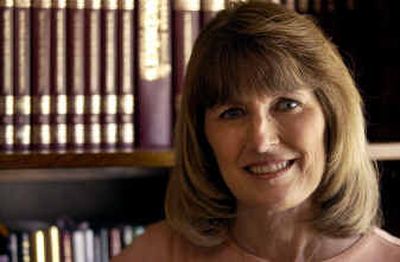Mother wants novel yanked

A parent is petitioning the Central Valley School District to take a novel with sexual content off the 10th-grade reading list.
Donna Orme said she was shocked when her 16-year-old daughter, Sarah, showed her a series of passages in Bernard Malamud’s “The Natural,” a novel about baseball that was first published in 1952.
Sarah Orme was assigned to read the book in her 10th-grade English class at University High School last fall; the book is also taught at Central Valley High School.
“I didn’t realize what she was reading until she was way into the book,” Donna Orme said.
Sarah Orme said she was uncomfortable with the book’s intimate scenes. In a few passages, the author describes characters kissing, skinny dipping or in the moments before intercourse, sometimes detailing the appearance of a woman’s breasts and nipples.
“I thought it was inappropriate for high school,” she said.
English teacher Dave Smith said that the book, which is significantly different from its 1984 film adaptation, conveys themes about human nature crucial for high school students to understand.
“It’s about the way human beings treat each other,” he said. “It’s about man’s inhumanity to man on a microscopic level.”
Still, for the past nine months, Orme has been lobbying the school district to drop the book from the curriculum. She took her concerns to the school board this week, along with a petition signed by more than 60 Central Valley parents and grandparents.
“All books and knowledge are not of the same value,” Orme told the school board. “Some are uplifting and move us to become better individuals. Other knowledge is degrading, filthy and damaging to the character.”
The school board did not comment on Orme’s proposal, but it asked Superintendent Mike Pearson to respond to her concerns.
Pearson said he will invite Orme to appear before the Instructional Materials Committee, a group of teachers, administrators and parents that oversees the district’s curriculum lists.
“Not to be put on trial,” he said. “But to say, ‘Here are my concerns about this book.’ “
The members of the committee will then read the book and decide whether to do nothing, take the book off the list or pull it from the library altogether.
“I believe in the process we have,” Pearson said. “It’s a good process.”
School districts across Spokane have similar approaches. Karin Short, an executive director for the Spokane School District, said it recently heard a challenge of a book for third-graders about the geological history of Spokane. The book was challenged because of its evolutionary message, but it was not removed from the curriculum or the library.
Smith said he chose to teach “The Natural” because boys who might otherwise scoff at reading are willing to consider a book about baseball. Smith uses the book to launch into a study of Charlotte Bronte’s “Jane Eyre,” drawing comparisons between male and female relationships in different historical periods.
Orme isn’t swayed by his argument.
“I don’t care what the literary value is of the book,” she said. “I’m not for huge censorship. (But) when I’ve shown this to people they’ve called it filth and scum and pornography.”
According to the American Library Association, thousands of books are challenged each year. Classics such as “Huckleberry Finn” and “To Kill a Mockingbird” regularly appear on the list of the 100 most frequently challenged books. Although “The Natural” is not on the list, recent books such as “Harry Potter” and “Heather Has Two Mommies” have been added.
The association cautions against banning books in order to preserve intellectual freedom and defend the First Amendment. Konny Thompson, acquisitions librarian at Gonzaga University’s Foley Library, agrees with the organization’s position.
“People, even children, need diversity of opinion to learn,” she said. “There is no way to have a library (without) anything in it that (could) offend someone. If that was our goal, you would have a library full of blank books.”
Orme said she spent about a month collecting signatures for her petition. She said every person she invited to sign chose to do so after reading the questionable passages.
“I wanted to convince myself that I wasn’t an extremist, that I wasn’t alone,” she said, adding that she’s been frustrated by the amount of time it has taken for her point to be heard. She first complained about the book in October but said it wasn’t until recently that she learned she could formally challenge the work.
“It shouldn’t take a year to get this resolved.”